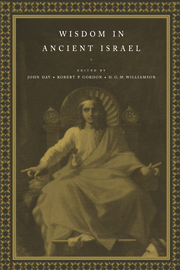Book contents
- Frontmatter
- Contents
- List of abbreviations
- Introduction
- Part 1 The ancient near eastern setting
- 1 Egyptian wisdom literature
- 2 Some new Babylonian wisdom literature
- 3 The Wisdom of Ahiqar
- Part 2 Old Testament and Apocryphal texts
- Part 3 Themes
- Biographical note: John Adney Emerton
- Bibliography of the works of John Adney Emerton
- Indexes
- Principal biblical and apocryphal references
1 - Egyptian wisdom literature
Published online by Cambridge University Press: 16 October 2009
- Frontmatter
- Contents
- List of abbreviations
- Introduction
- Part 1 The ancient near eastern setting
- 1 Egyptian wisdom literature
- 2 Some new Babylonian wisdom literature
- 3 The Wisdom of Ahiqar
- Part 2 Old Testament and Apocryphal texts
- Part 3 Themes
- Biographical note: John Adney Emerton
- Bibliography of the works of John Adney Emerton
- Indexes
- Principal biblical and apocryphal references
Summary
Pharaoh was the incarnation of the sun-god, and the light of his presence illuminated the Nile Valley. Such was his splendour that neighbouring states found it impossible to ignore his influence, and this was particularly true of the land of Palestine. Palestine was poor, fragmented and anarchic, while Egypt for most of its history was the opposite: agriculturally wealthy and possessing great natural resources, artistically sophisticated, militarily powerful, and the first state in history to enjoy centralized government. The Old Testament is full of the shadows cast by Pharaoh's sun, and the result – a mixture of admiration, distrust, envy and emulation, often at the same time – shows through in its pages, from the nostalgia of the Children of Israel in Sinai to the denunciations of Ezekiel and Jeremiah. Part of the fascination of the Joseph story for its Jewish audience must have been that it showed a poor Hebrew beating the most cultured society of the ancient near east at its own game, and there must have been many who wished that they could do the same. However, Egypt's position in the biblical world was more complex than this: its wealth and sophistication made it a target for immigration at most periods, and this was frequently seen as a problem by the Egyptians themselves. Feelings of cultural superiority kept the Egyptians, or certainly their government, from appreciating foreign innovations, and the technological and intellectual history of the country is one of acute fits and starts, as the Egyptians realized the need for a new process or idea and rushed to catch up. The innovation was often disguised as something purely Egyptian from the outset, and pride was satisfied.
- Type
- Chapter
- Information
- Wisdom in Ancient Israel , pp. 17 - 29Publisher: Cambridge University PressPrint publication year: 1995



